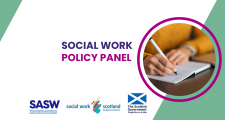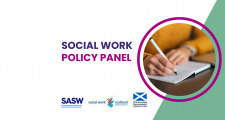Social Work Policy Panel newsletter October 2025

Next SWPP - Update on the Scottish Social Work Partnership
11th November 2025 12-1pm.
Book your free place Social Work Policy Panel - Tue 11 November 2025.
Notes from October’s meeting:
Addressing Racism Through the Anti-Racism Action Plan: Session Summary
On 7 October 2025, the Social Work Policy Panel hosted a session examining cultural competency and anti-racism in social work, bringing together colleagues from across Scotland to explore how the profession can better support both its diverse workforce and the communities it serves.
Cultural Competency and Intelligence - CFAB
Sorcha Morgan and Michael Nwoye from CFAB (Children and Families Across Borders) opened the session. CFAB operates within a network of over 130 partner agencies worldwide, facilitating cross-border child protection work. Sorcha highlighted that nearly 36% of babies born in England and Wales in 2022 had at least one parent born outside the UK (26% in Scotland), meaning social workers increasingly work with families who have international connections.
Michael, formerly a social worker in Nigeria, delivered a powerful presentation on culture, emphasising the need to move beyond cultural awareness to genuine competency through respectful curiosity and humility. He shared practical examples of how cultural differences can be misinterpreted: children not making eye contact may indicate respect rather than attachment issues; silent mealtimes might be cultural norms rather than signs of dysfunction; and loud communication styles may be typical rather than indicative of conflict.
Michael stressed the importance of preparation before home visits: being mindful of prayer times, understanding customs around removing shoes and appropriate greetings, and accepting offers of refreshments as opportunities for genuine connection. He cautioned against broad generalisations, noting that Nigeria alone has over 500 languages and 250 ethnic groups. His central message: social workers must recognise their own biases, approach families with genuine interest rather than to tick boxes and understand culturally appropriate behaviours and presentations.
The key is to ask questions respectfully, understand context, and work collaboratively with families.
Anti-Racism Action Plan - SASW
Susan Dobson from the Scottish Association of Social Work addressed racism within the profession itself.
The Scottish Government released its Anti-Racism Action Plan in August 2025 following a 2020 SASW survey revealing experiences of racism in social work from higher caseloads for minority ethnic workers to overt discrimination.
The action plan focuses on four areas: improving incident management and recording; fostering anti-racist workplace cultures; advancing racial equality in career progression (addressing the lack of minority ethnic representation in senior management); and promoting cultural competency through reflective spaces and tailored training.
Research by Iriss revealed a significant perception gap: 91% of minority ethnic respondents identified racism as a significant issue compared to only 61% of the dominant ethnicity. Of 20 respondents who reported experiencing racism in the previous year, nine received no response whatsoever, and the remaining eleven found interventions largely unhelpful. Around one third of social workers had received anti-racism training, but many found it difficult to apply to social work contexts.
In response, SASW was commissioned by Scottish Social Services Council (SSSC) to develop a practical four-module learning resource, now available through the SSSC website, designed to give social workers tools and language to challenge racism and reflect on their own practice.
Discussion:
Why This Work Matters Now
The chair opened discussion by addressing Scottish exceptionalism: the notion that "we're Scottish, therefore we cannot be racist." The panel’s view was that this is fundamentally a rights issue: if social workers do not feel safe in their workplaces and managers don't respond appropriately to racism, how can they sustain themselves in their work or provide the safety that vulnerable families desperately need?
Michael from CFAB shared his deeply personal perspective: "I'm quite unfortunately invested in this because it's my reality." He described a recent encounter with a young person who, despite having good social support, does not feel welcome in the UK and would prefer to return to his war-torn country. The panel also heard of colleagues in the BASW Diaspora Special Interest Group who have been attacked whilst trying to help families, including British-born workers whose families have been in the UK for generations, leading them to question whether they are in the right profession or the right country.
The Leadership Disconnect
A colleague from BASW Wales highlighted a crucial disconnect: directors claim that racism is not really an issue in their local authorities, while social workers in those same boroughs are consistently the only person expected to raise concerns about racism and microaggressions. This gap exists in both rural areas and cities.
Realistic Expectations for Change
The action plan is only as good as the people who get behind it, otherwise it remains words on a page. Progress is underpinned by a fundamental question: how much abuse should someone expect to experience in their work? Safety and protection from abuse at work is not a "nice extra to have" but an absolute essential.
Social Work Scotland representatives emphasised their organisation's commitment to supporting managers and leaders to have difficult conversations about racism, even when it is not their personal experience. We need to stop constantly asking those who experience racism to repeat their stories, and instead to shift responsibility to managers and leaders to drive change through organisational structures, policies, and HR processes.
Conclusion
The session's key message was unequivocal: creating safety for social workers from diverse backgrounds is not optional but essential. Given the current political climate and challenges to community cohesion, this represents a crucial point in history to challenge racism. Achieving meaningful change requires genuine commitment, uncomfortable conversations, and systemic change at every level of the profession: from individual practice to organisational leadership.
About the Social Work Policy Panel
All students, newly qualified and experienced social workers are welcome to come along to our events.
The panel is jointly run by the Scottish Association of Social Work, the Office of the Chief Social Work Adviser, and Social Work Scotland. It was created to bring frontline workers and policy makers in Government together to address the issues affecting social work today. It is an opportunity to influence those policy makers and the future of social work with your experience and knowledge.
As a social worker, we know you’re busy and facing lots of competing pressures. That’s why we want to make the panel as influential and meaningful as possible.
Get in touch with us through the panel mailbox: SWPP@basw.co.uk
Susan DobsonThe action plan is only as good as the people who get behind it
Our next Session
Update on the Scottish Social Work Partnership
11th November 2025 12-1pm.
About the Social Work Policy Panel
All students, newly qualified and experienced social workers are welcome to come along to our events.
The panel is jointly run by the Scottish Association of Social Work, the Office of the Chief Social Work Adviser, and Social Work Scotland. The panel was created to bring frontline workers and policy makers in Government together to address the issues affecting social work today. It is an opportunity to influence those policy makers and the future of social work with your experience and knowledge.
As a social worker, we know you’re busy and facing lots of competing pressures. That’s why we want to make the panel as influential and meaningful as possible.

What is the Social Work Professional Support Service (SWPSS)?
Free coaching service for all social workers and social work students in Scotland.
- A FREE and independent peer coaching service by and for social workers
- Has an ambition to have an impact on the culture of practice enabling social workers to be able take care of yourselves
- Facilitated by experienced and trained social work coaches who volunteer their time
- Provides you with a safe and empathetic space to think through any professional and/or personal challenges you may be facing
- Offers a confidential peer to peer listening space
- Supports self-care, wellbeing and empowerment
- Supported by the Scottish Government
The service is geared to provide coaching support whether you are a student, social work practitioner or manager. We have coaches from different fields and the whole range of experiences - choose your own coach and set up a session at a time that suits you.
Social workers have used the service to talk through their career planning and development needs, the impact of the work role on their personal life/health, placements, to gain confidence, to process the experience of being bullied/racially targeted or to manage change/turbulences in the organisations they work for.
